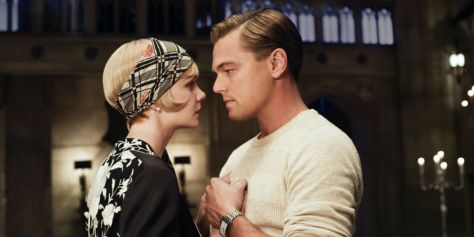
Baz Luhrmann never met an exclamation point he didn’t love!
The Great Gatsby, his scintillating version of F. Scott Fitzgerald’s novel, may be garish and boorish and brutish and extravagant — and it is all of those things and more — yet it is never insincere; it never puts on airs and pretends to be something that it is not.
Based on Romeo + Juliet (1996), Moulin Rouge! (2001), and Australia (2008), it would have been shocking only if The Great Gatsby did not splurge on excessive style. The setting of Fitzgerald’s novel — the Roaring Twenties, specifically the summer of 1922 in Long Island and Manhattan — appears to be a perfect fit for Luhrmann’s artistic sensibilities, which cry out for opportunities to display exquisite beauty and to showcase an exuberant color palette.
Luhrmann’s partner in crime, producer and production designer Catherine Martin, is fully his equal, overseeing and directing the creation of magnificent sets, sparkling costumes, and luxurious wardrobes. Simon Duggan, a first time colloborator as director of photography, certainly complements Luhrmann’s taste for glossy, gorgeous imagery.
Having these points in mind, then, Baz Luhrmann’s The Great Gatsby fully meets expectations. It’s exactly the kind of movie that I anticipated Luhrmann would make from the source material. It’s never less than an eyeful and a half, but it’s also never more than a designer outfit on a mannequin.
Fidelity to Fitzgerald’s novel is never an issue, though the screenplay by Luhrmann and usual colloborator Craig Pearce adds an unnecessary framing device to further distance the viewer from the emotional experience at hand. The movie hews closely enough to the original narrative turns to be considered faithful. The spirit, however, is quite different.
That’s to be expected, of course, considering that the book was first published in 1925; it was a commentary on a decade that was still evolving as Fitzgerald wrote. I haven’t seen the 1949 version, featuring Alan Ladd as Gatsby, but I recently watched the 1974 version, directed by Jack Clayton, which starred a miscast Robert Redford as Gatsby, Mia Farrow as Daisy, Bruce Dern as Tom, Sam Waterston as Nick, Lois Chiles as Jordan, Karen Black as Myrtle, Scott Wilson as George, and Howard Da Silva as Meyer. It’s a stodgy, conversative picture, very proper and absolutely beautiful in its own way, but the cast members often appear to be acting in different pictures. Redford’s reserve prevents any hint of vulnerability to shine though, and he generates no chemistry with Farrow.
Luhrmann fares better with his cast. Leonardo DiCaprio trips gaily over a wide range of emotions as Gatsby, conveying the anguish of romantic idealism. Carey Mulligan emotes a tearfu, fragile personality as Daisy, Joel Edgerton is very strong as the brutish Tom, and Tobey Maguire is a convincingly passive observer with occasional flashes of anger. Oddly enough, the characters played by Elizabeth Debicki (Jordan), Isla Fisher (Myrtle), Jason Clarke (George), and Amitabh Bachchan (Meyer) are shunted aside more so than in the book or the 1974 film version, so there are fewer moments for those actors to make much more than positive, if fleeting, impressions.
Anachronisms abound on the soundtrack, but it’s not wall-to-wall with modern music; there’s still space for Craig Armstrong’s original compositions and other music that captures the spirit of the times.
What, then, is the problem? Well, it’s inherent in Luhrmann’s approach to the material. The film is both too literal and too phantasmagorical to be taken seriously and/or accepted at face value. On the one hand, the aggressive, “filmic” moments that constantly call attention to themselves are quite effective; it’s easy to become entranced by the fantastic visual touches that distinguish Luhrmann’s vision.
On the other hand, the film also insists on talking and explaining and repeating and making explicit the same points that are being made visually. I imagine this is great for anyone who is blind and/or deaf, but for everyone else, it’s like watching a captivating movie in your native language with closed captioning turned on while listening to someone provide an audio commentary on what you’re watching. It overloads the senses and limits the effectiveness of the entire experience.
Those contradictions also place it squarely within the filmmaker’s apparent artistic ambitions. On those terms, the movie delivers exactly what is expected of it.
Note: The film was post-converted to 3D, which adds little to the experience except a surcharge on the price of a ticket.
The Great Gatsby opens wide across the Metroplex on Friday, May 10.